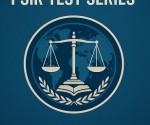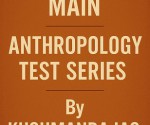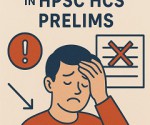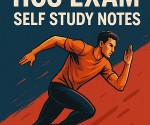HCS EXAM 2013
                   HCS (MAIN) EXAMÂ
                                       Indian History
                                       Test paper-8
Time : 3 Hours                                                                                               M. Marks : 150
Note : Attempt Five questions in all. All questions carry equal marks. Questions No.1 is     compulsary. Answer two questions from Part-I and two questions from Part-II. The parts of the same questions must be answered together and not be interpassed between anwers to other questions.
Â
1. Write notes on any four of the following:
                                                                                                                  (4×7.5=30)
(a) Meaning and features of the Maharshtra Dharma
(b) Assess Kalhana’s views on History
(b) Chaianyadeva and Vaishnavism
(c) At Karachi in 1931 , the congress defined what Swaraj would mean for the massesâ€.
(d) ‘The Treaty of Salbai (1782) was neither honourable to the English nor advantageous to their interests.’ was imperfect.’ results that were not anticipated.’ entirely separate sovereign States.’ of Plassey..
(f) The British Indian State experienced the ‘wind of change’ with the arrival of Lord
William Bentinck.
Part-I
2. ‘Harshvardhan was himself great, but he has been made greater by Ban and Yuan
Chiang. ‘ Critically examine the statement.                                                 30
3. Examine sources of information for Mauryan dynasty. Throw light on historical
significance of Ashoka’s inscriptions.                                                          30
4. Discuss balban’s concept of kingship. How was it modified by Aluddin Khalji?30
Part-II
5. Examine the causes of the rise and progress of revolutionary movements in India
from 1905 to 1931.                                                                                                  30
6. Trace the development of the famine policy of the British in India 1876 and 1921.
Did it provide relief to the people?.                                                                                30
7. Discuss the nature of the leadership and programme of the Congress Socialist party.30
Â
Â
Â
Â
Â
Â
Â
Â
Â
                                   HCS (MAIN) EXAMÂ
                                       Indian History
                                       Test paper-9
Time : 3 Hours                                                                                             M. Marks : 150
Note : Attempt Five questions in all. All questions carry equal marks. Questions
No.1 is compulsary. Answer two questions from Part-I and two questions from Part-II. The parts of the same questions must be answered together and not be interpassed between anwers to other questions.
Â
1. Write notes on any four of the following:
(4×7.5=30)
(a) The Vedanta of Sankaracharya
(b) Give a critical assessment of the contributions of Amir
Khusarau and Barani to Indo – Persian Literature
(b) The Bahamani Kingdom
(c) Mansabdari System
(d) Though the Permanent Settlement had serious defects , it gave tranquility to the       countryside and stability to the governmentâ€.
(f) “The verdict at Plassey was confirmed by the English victory at Buxarâ€.
Part-I
2. Give a brief account of the social and economic conditions of the Later Vedic Aryans.
What role did iron play in changing their political and economic life ?            30
3. How did Indian culture spread in the South-east Asiatic countries during the Gupta
Age ?. 30
4. Akbar built the Mughal Empire by enlisting the support of the Rajputs; Aurangzeb
destroyed it by alienating the Rajputs.†Discuss critically30
Part-II
5 Examine the nature of the Revolt of 1857 and indicate the manifold changes in British
civil and military administration of India after 1857.. 30
6. Trace the origin and growth of the Indian Muslim League.. 30
7. Gandhi restrained mass-movements yet he retained his popularity among the masses.
How do you explain this paradox?30
Â
Â
Â
Â
Â
Â
Â
Â
Â
Â
                  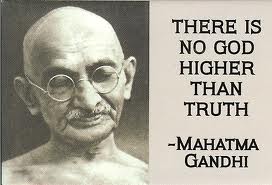 HCS (MAIN) EXAMÂ
HCS (MAIN) EXAMÂ
                                       Indian History
                                       Test paper-10
Time : 3 Hours                                                                                 M. Marks : 150
Note : Attempt Five questions in all. All questions carry equal marks. Questions
No.1 is compulsary. Answer two questions from Part-I and two questions
from Part-II. The parts of the same questions must be answered together
and not be interpassed between anwers to other questions.
Â
1. Write notes on any four of the following:
(4×7.5=30)
(a) Vedic rituals
(b) Assess Kalhana’s views on History
(b) Was Din-i-Ilahi ‘a monument of Akbar’s folly’ ?
(c) Chauth and Sardeshmukhi of the Maratha rulers
(d) The British conquered India “in a fit of absent mindness”.
(f) Architecture of the Vijayanagara empire.
Part-I
2. Analyse the elements of urban civilization in the harappan Culture. What factors were
Responsible for its decline?                                                                     30
3. Examine the nature of the mauryan State. Bring out the features of their
administrative system.                                                                          30
4. Did the triangular conflict between the Rashtrakutas, Gujara Pratiharas and Palas
create a political
vaccum in northern India which facilitated the invasions of Mahmud of Ghazni? 30
Part-II
5. Discuss the important social reform legislation passed in the 19th century. and
elucidate the reaction of Indian leaders to the measures adopted..                     30
6 Discuss the view that the British rule brought about economic changes in India to
serve the needs of the imperial economy and establish a dependent form of
underdevelopment in this country..                                                                         30
7. Explain the attitude of the Indian National Congress towards the constitutional
changes of 1909, 1919 and 1935.                                                            30












